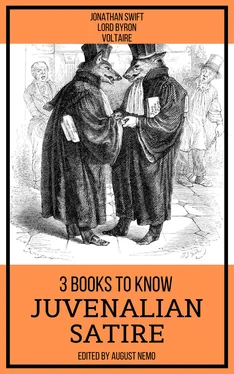And tumble downward like the flying fish
Gasping on deck, because you soar too high,
Bob, And fall for lack of moisture quite a dry Bob.
And Wordsworth in a rather long Excursion
(I think the quarto holds five hundred pages)
Has given a sample from the vasty version
Of his new system to perplex the sages.
'Tis poetry, at least by his assertion,
And may appear so when the Dog Star rages,
And he who understands it would be able
To add a story to the tower of Babel.
You gentlemen, by dint of long seclusion
From better company, have kept your own
At Keswick, and through still continued fusion
Of one another's minds at last have grown
To deem, as a most logical conclusion,
That poesy has wreaths for you alone.
There is a narrowness in such a notion,
Which makes me wish you'd change your lakes for ocean.
I would not imitate the petty thought,
Nor coin my self-love to so base a vice,
For all the glory your conversion brought,
Since gold alone should not have been its price.
You have your salary; was't for that you wrought?
And Wordsworth has his place in the Excise.
You're shabby fellows—true—but poets still
And duly seated on the immortal hill.
Your bays may hide the baldness of your brows,
Perhaps some virtuous blushes; let them go.
To you I envy neither fruit nor boughs,
And for the fame you would engross below,
The field is universal and allows
Scope to all such as feel the inherent glow.
Scott, Rogers, Campbell, Moore, and Crabbe will try
'Gainst you the question with posterity.
For me, who, wandering with pedestrian Muses,
Contend not with you on the winged' steed,
I wish your fate may yield ye, when she chooses,
The fame you envy and the skill you need.
And recollect a poet nothing loses
In giving to his brethren their full meed
Of merit, and complaint of present days
Is not the certain path to future praise.
He that reserves his laurels for posterity
(Who does not often claim the bright reversion)
Has generally no great crop to spare it, he
Being only injured by his own assertion.
And although here and there some glorious rarity
Arise like Titan from the sea's immersion,
The major part of such appellants go
To—God knows where—for no one else can know.
If fallen in evil days on evil tongues,
Milton appealed to the avenger, Time,
If Time, the avenger, execrates his wrongs
And makes the word Miltonic mean sublime,
He deigned not to belie his soul in songs,
Nor turn his very talent to a crime.
He did not loathe the sire to laud the son,
But closed the tyrant-hater he begun.
Think'st thou, could he, the blind old man, arise
Like Samuel from the grave to freeze once more
The blood of monarchs with his prophecies,
Or be alive again—again all hoar
With time and trials, and those helpless eyes
And heartless daughters—worn and pale and poor,
Would he adore a sultan? He obey
The intellectual eunuch Castlereagh?
Cold-blooded, smooth-faced, placid miscreant!
Dabbling its sleek young hands in Erin's gore,
And thus for wider carnage taught to pant,
Transferred to gorge upon a sister shore,
The vulgarest tool that tyranny could want,
With just enough of talent and no more,
To lengthen fetters by another fixed
And offer poison long already mixed.
An orator of such set trash of phrase,
Ineffably, legitimately vile,
That even its grossest flatterers dare not praise,
Nor foes—all nations—condescend to smile.
Not even a sprightly blunder's spark can blaze
From that Ixion grindstone's ceaseless toil,
That turns and turns to give the world a notion
Of endless torments and perpetual motion.
A bungler even in its disgusting trade,
And botching, patching, leaving still behind
Something of which its masters are afraid,
States to be curbed and thoughts to be confined,
Conspiracy or congress to be made,
Cobbling at manacles for all mankind,
A tinkering slave-maker, who mends old chains,
With God and man's abhorrence for its gains.
If we may judge of matter by the mind,
Emasculated to the marrow, it
Hath but two objects, how to serve and bind,
Deeming the chain it wears even men may fit,
Eutropius of its many masters, blind
To worth as freedom, wisdom as to wit,
Fearless, because no feeling dwells in ice;
Its very courage stagnates to a vice.
Where shall I turn me not to view its bonds,
For I will never feel them. Italy,
Thy late reviving Roman soul desponds
Beneath the lie this state-thing breathed o'er thee.
Thy clanking chain and Erin's yet green wounds
Have voices, tongues to cry aloud for me.
Europe has slaves, allies, kings, armies still,
And Southey lives to sing them very ill.
Meantime, Sir Laureate, I proceed to dedicate
In honest simple verse this song to you.
And if in flattering strains I do not predicate,
'Tis that I still retain my buff and blue;
My politics as yet are all to educate.
Apostasy's so fashionable too,
To keep one creed's a task grown quite
Herculean Is it not so, my Tory, ultra-Julian?
––––––––

I want a hero: an uncommon want,
When every year and month sends forth a new one,
Till, after cloying the gazettes with cant,
The age discovers he is not the true one;
Of such as these I should not care to vaunt,
I 'll therefore take our ancient friend Don Juan—
We all have seen him, in the pantomime,
Sent to the devil somewhat ere his time.
Vernon, the butcher Cumberland, Wolfe, Hawke,
Prince Ferdinand, Granby, Burgoyne, Keppel, Howe,
Evil and good, have had their tithe of talk,
And fill'd their sign posts then, like Wellesley now;
Each in their turn like Banquo's monarchs stalk,
Followers of fame, 'nine farrow' of that sow:
France, too, had Buonaparte and Dumourier
Recorded in the Moniteur and Courier.
Barnave, Brissot, Condorcet, Mirabeau,
Petion, Clootz, Danton, Marat, La Fayette,
Were French, and famous people, as we know:
And there were others, scarce forgotten yet,
Joubert, Hoche, Marceau, Lannes, Desaix, Moreau,
With many of the military set,
Exceedingly remarkable at times,
But not at all adapted to my rhymes.
Nelson was once Britannia's god of war,
And still should be so, but the tide is turn'd;
There 's no more to be said of Trafalgar,
'T is with our hero quietly inurn'd;
Because the army 's grown more popular,
At which the naval people are concern'd;
Besides, the prince is all for the land-service,
Forgetting Duncan, Nelson, Howe, and Jervis.
Brave men were living before Agamemnon
And since, exceeding valorous and sage,
A good deal like him too, though quite the same none;
But then they shone not on the poet's page,
And so have been forgotten:—I condemn none,
But can't find any in the present age
Fit for my poem (that is, for my new one);
So, as I said, I 'll take my friend Don Juan.
Most epic poets plunge 'in medias res'
(Horace makes this the heroic turnpike road),
And then your hero tells, whene'er you please,
What went before—by way of episode,
While seated after dinner at his ease,
Beside his mistress in some soft abode,
Читать дальше













